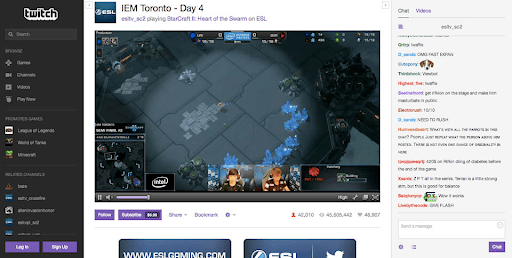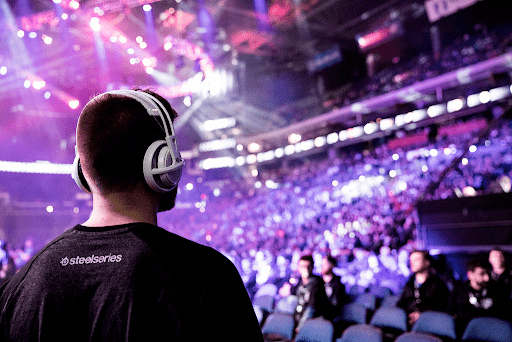Whether you’re a multi-national company or a budding influencer, eSports is one word that needs to be on your radar in 2019. According to Forbes, the competitive gaming industry is growing steadily by more than 40 percent each year, and is expected to reach $1.7 billion in revenue by 2021. Of that, the vast majority is estimated to come from to sponsorships and advertising. Along with a young, tech-savvy and international audience, the world of eSports presents an exciting development in digital entertainment and a tremendous opportunity for influencer marketing agencies.
e…Sports?
If you’re new to the concept, don’t sweat it – eSports is simply a term for organized competitive video games. Yes, games have come a long way since the days of Pacman, and so too has the technological and financial infrastructures surrounding them. Today, well-funded organizations recruit the top players from around the world to compete in live clashes of popular titles such as Overwatch, League of Legends and Fortnite (perhaps 2018’s biggest social media darling). These events, which are often run by the same studios that design the games, can draw huge crowds and even more viewers. For example, one of 2017’s most-watched eSports event, the Intel Extreme Masters, attracted over 46 million pairs of eyeballs.
And no, that wasn’t a typo.
Premiere eSports events are quickly becoming some of the biggest moments in all of entertainment. For reference, HBO’s Game of Throne made industry-wide headlines with their season 7 finale that clocked in at roughly 16.5 million viewers. Meanwhile, the 2018 League of Legends World Championships generated more than 81 million hours of live viewership. With numbers like that, it’s easy to see why even traditional sports institutions are eager to join the field, such as the NFL’s recent partnership with Fortnite (did we mention brands love Fornite?).
I Stream, You Stream, We All Stream
Although eSports have existed since the first arcades, their meteoric rise is due in large part to the equally-explosive success of streaming platforms such as Twitch.tv. Created in 2011, Twitch is a site that allows users to broadcast content to any number of “followers”, whenever and wherever. Followers can interact with content in real-time via a public chat box, and even donate money to channels in order to receive special perks such as comment highlights and custom emojis.
Streamers have a range of options to monetize their work, from brand sponsorships to pre-roll ads to monthly donation services such as Patreon. Like YouTubers and Instagrammers before them, savvy Twitch users are able to ditch the 9-5 and live full-time off of their content.

Photo courtesy of ESL Gaming/Endgadget
Although it took a few years (and one Amazon buyout) to reach mainstream appeal, Twitch nevertheless boasts some pretty impressive figures. According to the BBC, viewers streamed over 775 million hours of content in July of 2018 alone – for fear of stating the obvious, that’s a lot of video! While audiences can find a range of genres on Twitch, the platform is most synonymous with its gaming channels. Take your pick from among the site’s biggest names and you’re likely to find a gamer, game developer, or professional eSports team.
Marketers from within the gaming industry have been quick to put their products in front of this rapidly growing and engaged audience. According to one study, upwards of half of all ad money in eSports is endemic, but bigger brands have begun to take notice. Coca-Cola, Bud-Light and Dollar Shave Club are but a few big-name companies entering the space, looking to seize valuable market share before the competition.
How successful brands will be, of course, depends on the tactics they use when addressing this young, tech-savvy audience. Enter Influencer Marketing.
Influencer Marketing and eSports: Game, Set, Match
To put it simply, Influencer Marketing and eSports go together like Olympians and Wheaties boxes. Whether it’s a fully-funded team or a lone streamer, many eSports figures are bonafide social media stars in their own right, amassing thousands of followers across all platforms such as Twitter, Instagram and YouTube. Some of today’s most respected brands are busy striking deals with gaming’s hottest names, such as T-Mobile’s official sponsorship of the Houston Outlaws (a Texas-based Overwatch league that would sound equally appropriate for a minor league baseball team).
At present, sponsorships are the most popular form of marketing in eSports. But some companies are already looking at innovative ways to engage fans through a more targeted use of influencers, such as Bud Light’s All Stars campaign. In this activation, fans of the popular series Overwatch were tasked with voting for their favorite players, with the winners competing in a specially streamed “Happy Hour” tournament hosted by Bud Light.
And, of course, there can be no mention of influencers and eSports without talking about Drake. Yes, even superstar Drake is turning to gaming for a little extra exposure, making waves this past April in a surprise collab with Twitch’s most beloved streamer, Ninja. As eSports propels itself further into the mainstream, we can expect even more A-list talent to step in the ring with influencers from across gaming’s swiftly growing pantheon.
Level Up
The world of eSports is a bold new frontier for marketers and businesses alike. But like any good video game, huge rewards await those who take the time to master the rules. For brands, this includes a firm grasp of the various strengths and weaknesses of each platform, so no audience goes ignored. Since Open Influence focuses on the advertiser’s needs, we strive to be platform-agnostic and match brands with the right influences, no matter where they are. If you’re a little rusty on the differences between Twitch and YouTube, or just want a quick refresher on today’s most popular platforms, check out our ebook here!

